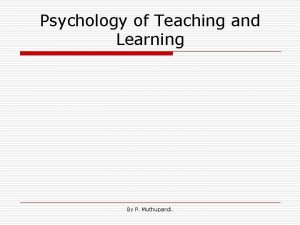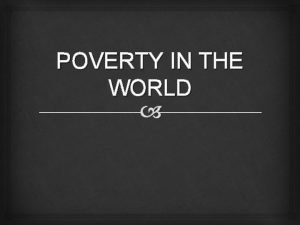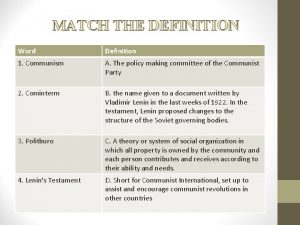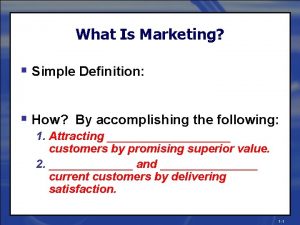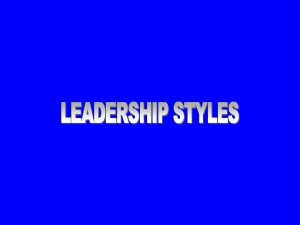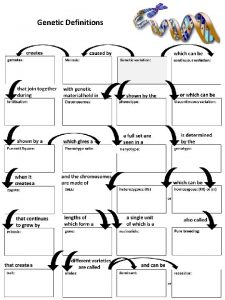DEFINITION OF LEADERSHIP LEADERSHIP DEFINITIONS Leadership is accomplishing

















- Slides: 17

DEFINITION OF LEADERSHIP


LEADERSHIP DEFINITIONS • "Leadership is accomplishing things that reach beyond solitary abilities by acting — and getting others to act — with a maturity that surpasses limited self-interest. " -- John Baker, president of READY Thinking, an organizational and leadership development firm. • "To paraphrase Dwight D. Eisenhower, 'leadership is the art of getting others to do things you want done and feel good about it. ' I would go so far as to say the goal is to get the person to embrace the "mission" and own it. " -- Dale Hamby, a former Army major

LEADERSHIP DEFINITIONS • "A leader isn't limited to those with positional authority. Leadership, instead, is defined alternatively as someone who influences others to achieve a common goal. This would represent the work and contributions of anyone who serves in this capacity. " -- Barbara Steel, senior vice president of leadership effectiveness at Zenger Folkman • "Leadership is getting people to want to follow. That requires engaging them passionately, from the heart, and requires persuading people to change. Management is tactical; leadership is strategic. " -- Tom Kennedy, a certified management consultant and principal of The Kennedy Group.

LEADERSHIP DEFINITIONS • "Leadership is when you give of yourself for the greater good of others with no expectation of reward. It's that willingness to jump in a ditch with your whole team so that the next time they fall in, everyone understands the best and easiest way to get out. As I deal mostly with military families who need guidance towards a sustainable future, leadership is absolutely concerned with getting down in the trenches to do the dirty work. " -- Roxanne Reed, executive director of the Military Spouse Foundation.

LEADERSHIP DEFINITIONS • Leadership is a process of social influence, which maximizes the efforts of others, towards the achievement of a goal. -- Kevin Kruse is the creator of the Leading for Employee Engagement e. Learning program for managers. and author of the bestselling book, Employee Engagement 2. 0.

LEADERSHIP IS… • Making vision a reality • Knowing what to do • Seeing the future and bringing into focus • Making stuff happen!!

LEADERSHIP IS… • To help a group reach a commonly agreed upon goal • To bring others together

• We cannot continue to have it both ways. We may like to use the word leadership as if it were value-free, particularly in an age of science and mathematics, so that we can describe far-ranging phenomena and people with consistency. Yet when we do so, we ignore the other half of ourselves that in the next breath speaks of leadership as something we desperately need more of. We cannot talk about a crisis in leadership and then say leadership is value-free. Do we merely mean that we have too few people in our midst who can gather a following? Surely, we are not asking for more messiahs of Waco and Jonestown who meet people's needs by offering tempting visions of rapture and sacrifice. The contradiction in our common understanding clouds not only the clarity of our thinking and scholarship; it shapes the quality of leadership we praise, teach, and get. • Heiftez, Leadership without Easy Answer, pg 13

PETER DRUCKER • 1909 -2005 • Founder of “modern management” • Invented “management by objective” • Books – The Effective Executive; The Practice of Management; Concept of the Corporation • Born in Austria, moved to England in 1933, then to America, eventually settled in California, taught at Claremont Graduate University • Influence by economist Joseph Shumpeter, John Maynard Keynes • Jewish parents who converted to Christianity, raised in a “liberal Lutheran household”

DRUCKER ON LEADERSHIP : “The only definition of a leader is someone who has followers. ”

DRUCKER ON LEADERSHIP • Effective leadership is not about making speeches or being liked; leadership is defined by results not attributes. • There is nothing quite so useless as doing with great efficiency something that should not be done at all. • What gets measured gets improved. • So much of what we call management consists of making it difficult for people to work. • People who don't take risks generally make about two big mistakes a year. People who do take risks generally make about two big mistakes a year.

DRUCKER ON LEADERSHIP • Meetings are by definition a concession to a deficient organization. For one either meets or one works. One cannot do both at the same time. • Long-range planning does not deal with the future decisions, but with the future of present decisions. • Management is doing things right. Leadership is doing the right things

AND ALSO… • Purpose of a business is to serve customers, profit is necessary in order to keep doing that.

KOHLBERG AND GILLIGAN • Lawrence Kohlberg – theory of moral development • Highest stage -- Universal Principles. People at this stage have developed their own set of moral guidelines which may or may not fit the law. The principles apply to everyone. • E. g. human rights, justice and equality. The person will be prepared to act to defend these principles even if it means going against the rest of society in the process and having to pay the consequences of disapproval and or imprisonment.

KOHLBERG AND GILLIGAN • Carol Gilligan – student of Kohlberg, developed a feminist critique of his work • Gilligan argued that males and females are often socialized differently, and females are more apt than males to stress interpersonal relationships and take responsibility for the well-being of others. • Care based morality • Emphasizes interconnectedness and universality. • Acting justly means avoiding violence and helping those in need. • Relationships matter

LEADERSHIP IS • Leadership is choosing the proper balance of relationship, task, and preparation to help God’s people move further into God’s reign/kingdom.
 Accomplishing definition
Accomplishing definition Peter delisle leadership
Peter delisle leadership Definiton of nursing
Definiton of nursing Verbal irony
Verbal irony The problem of concept drift: definitions and related work
The problem of concept drift: definitions and related work Safety terms and definitions
Safety terms and definitions Framing terms and definitions
Framing terms and definitions Types of goniometer
Types of goniometer Meaning of public speaking
Meaning of public speaking Definitions of educational psychology
Definitions of educational psychology Rag status definitions
Rag status definitions Situational poverty definition
Situational poverty definition Verbal and non verbal communication
Verbal and non verbal communication Scaled down teaching situation
Scaled down teaching situation Material properties and definitions
Material properties and definitions Match the vocabulary word with its meaning. 1. communism
Match the vocabulary word with its meaning. 1. communism What are fundamental rights
What are fundamental rights Plot meaning in story
Plot meaning in story









